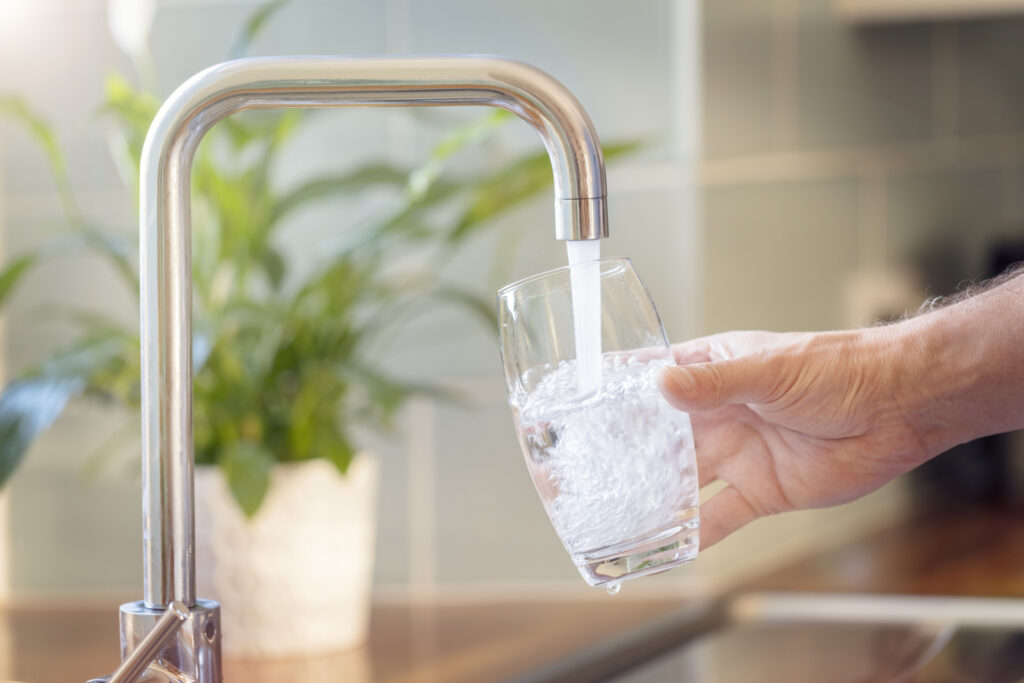Hard Water – Good For You, Bad For Your Home?
The water supply in the areas around the Dallas metroplex is known as “hard water”.
If you’ve lived in north Texas for more than a few years, you’re probably familiar with the problems associated with hard water.

What is Hard Water?
Water is considered hard when it has a high mineral content. By percolating through underground layers of mineral deposits like limestone and chalk, it picks up calcium and magnesium particles. If you have hard water in your area, then you will notice the effects almost immediately.
Surface Scale Spots When Water Dries
If you’ve put down a glass of water or inadvertently splashed water on to the kitchen counter top, after a few minutes, you see a light colored stain. When the water evaporates, you are left with the mineral scale deposits.
After washing dishes, you may notice a light film on what should be a clean plate. Again, these are the mineral deposits which are left when water evaporates. Most dishwasher liquids and powders come with a rinse aid which minimizes the effects of water spots.
Washing Clothes in Hard Water
Your clothes may start to feel scratchy or stiff, which is a result of the leftover minerals. You can offset this effect with fabric softener.
Many people choose to install a water softener system in their home. One of the first things they notice when washing clothes is the amount of “stuff” that is released, even when just washed in clean water with no laundry detergent.
Salt vs. Salt-Less Water Softeners
For some homeowners, installing a whole house water softener is a worthwhile investment. Ask our expert plumbers at Staggs Plumbing about the benefits of a water softener.
Some water softeners work by adding sodium into your water supply, which may not be the best solution if you are concerned about possible side effects from sodium. These are referred to as salt water softeners.
You may want to consider a salt-free water softener, also known as a “water conditioner”. These systems do not remove the hard water minerals, but rather prevent them from sticking to your pipes. The hard water goes through a process whereby the hard water minerals are crystallized, meaning they can no long adhere to surfaces, such as the inside of your pipes or your dishes.
If you prefer the taste of hard water over salt treated soft water, you may want to exclude your kitchen plumbing from the treated water. Because calcium and magnesium are part of our dietary requirements, drinking hard water is a little like taking a vitamin supplement.
Hard Water Scale Buildup in Pipes, Faucets and Appliances
The scaly residue from hard water accumulates inside the pipes around your home. It starts to clog up faucets, even dishwashers, washing machines and hot water heaters.
Hot water heaters in particular have a tendency to build up scale on the bottom of the unit, and makes it harder to heat up the water. Staggs Plumbing recommends flushing out your water heater once a year. This helps to prolong the life of your gas or electric water heater.
Some of the nozzles in dishwashers are small and tend to clog up quickly.
If your faucet or shower head is not flowing like it should, chances are you have calcium buildup. Sometimes you can rinse them out with off-the-shelf liquids from your local hardware store.
When pipes accumulate too much mineral buildup, the pressure in the pipes increases, which can lead to leaks and breaks in your water supply lines.
Our plumbers have a wide variety of tools at their disposal to deal with hard water and make everyday life easier for homeowners in hard water regions.


